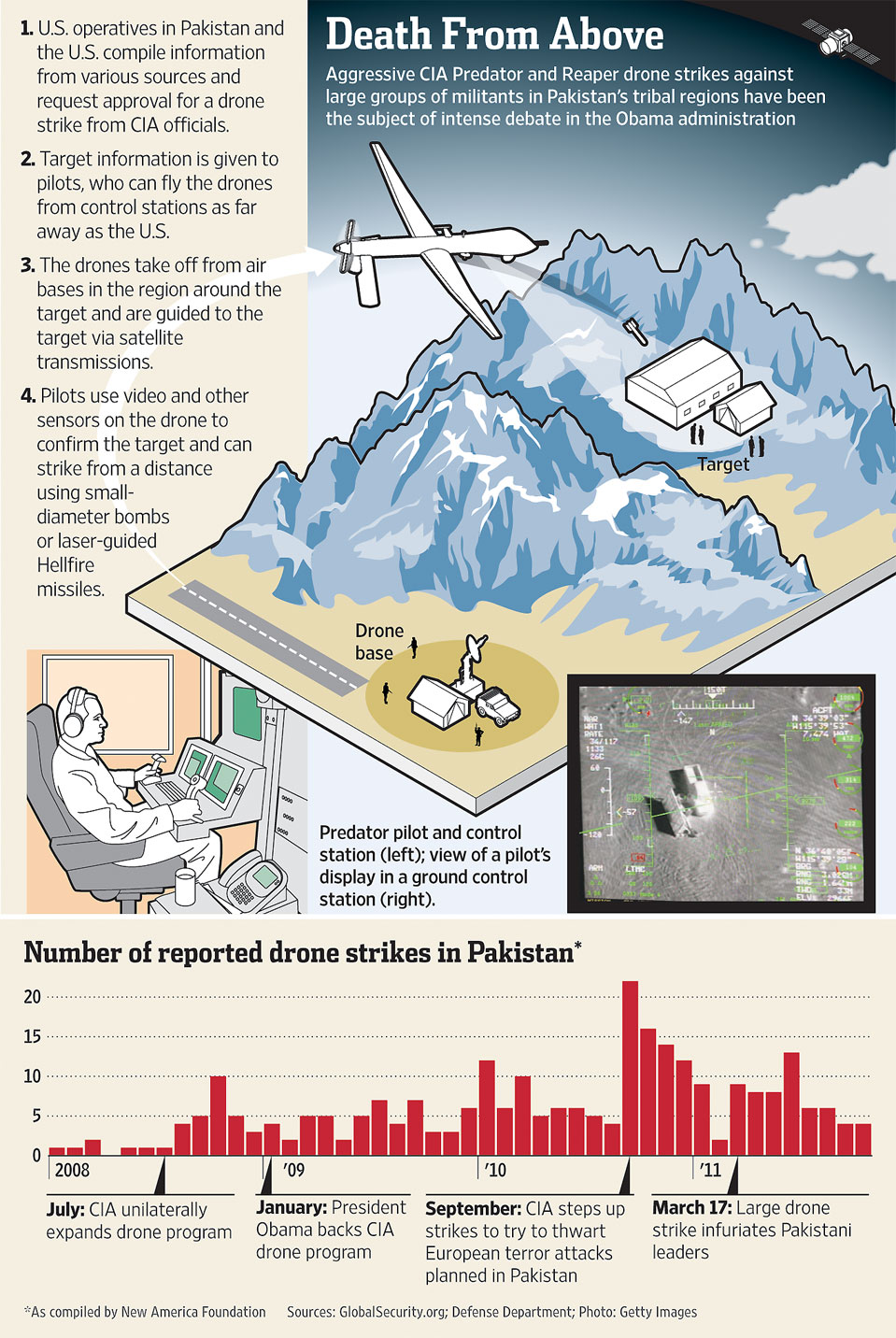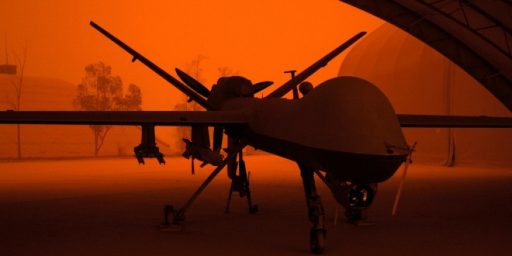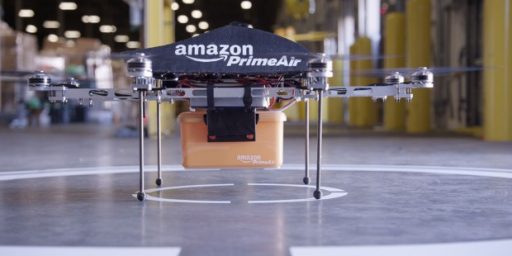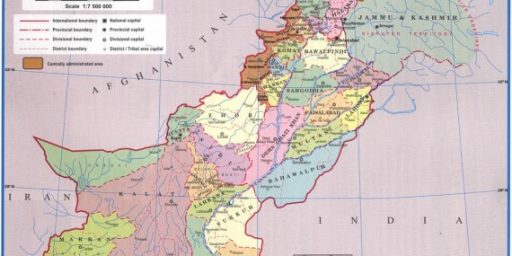Defense and State Reining in CIA Drone War
The CIA's drone war in Pakistan has gotten so out of hand that the Pentagon and State Department are reigning it in.
The CIA’s drone war in Pakistan has gotten so out of hand that the Pentagon and State Department are reining it in.
Adam Entous, Sioban Gorman, and Julian Barnes reporting for WSJ (“U.S. Tightens Drone Rules“):
The Central Intelligence Agency has made a series of secret concessions in its drone campaign after military and diplomatic officials complained large strikes were damaging the fragile U.S. relationship with Pakistan.
The covert drones are credited with killing hundreds of suspected militants, and few U.S. officials have publicly criticized the campaign, or its rapid expansion under President Barack Obama. Behind the scenes, however, many key U.S. military and State Department officials demanded more-selective strikes. That pitted them against CIA brass who want a free hand to pursue suspected militants.
The disputes over drones became so protracted that the White House launched a review over the summer, in which Mr. Obama intervened.
The review ultimately affirmed support for the underlying CIA program. But a senior official said: “The bar has been raised. Inside CIA, there is a recognition you need to be damn sure it’s worth it.”
What was the bar before?
Among the changes: The State Department won greater sway in strike decisions; Pakistani leaders got advance notice about more operations; and the CIA agreed to suspend operations when Pakistani officials visit the U.S.
The Pakistan drone debate already seems to be influencing thinking about the U.S. use of drones elsewhere in the world. In Yemen, the CIA used the pilotless aircraft in September to kill American-born cleric Anwar al-Awlaki, a suspected terrorist. But the White House has for now barred the CIA from attacking large groups of unidentified lower-level militants there.
The CIA concessions were detailed by high-level officials in a series of interviews with The Wall Street Journal. But in a measure of the discord, administration officials have different interpretations about the outcome of the White House review. While some cast the concessions as a “new phase” in which the CIA would weigh diplomacy more heavily in its activities, others said the impact was minimal and that the bar for vetting targets has been consistently high.
“Even if there are added considerations, the program—which still has strong support in Washington—remains as aggressive as ever,” said a U.S. official.
It’s not obvious from the report when all this took place. David Petraeus, easily the most famous American field general since World War II, just took over the agency on September 6. It would be odd to install a military commander, fresh from tours of duty in a war zone, as the head of CIA and simultaneously ratchet back the agency’s authority to make tactical decisions on strikes.
Then again, it has long struck me as more than a little odd that the CIA, not the Pentagon, is running our drone wars. Killing bad guys en masse isn’t really an intelligence mission, even granting that the line between intelligence “operations” and military operations has always been somewhat murky. And it’s no longer a matter of a strike every now and again as a complement to a wider operation. Increasingly, the drone war is the whole enchilada.
Last year, Mr. Obama expanded the CIA program to 14 drone “orbits.” Each orbit usually includes three drones, sufficient to provide constant surveillance over tribal areas of Pakistan. The CIA’s fleet of drones includes Predators and larger Reapers. The drones carry Hellfire missiles and sometimes bigger bombs, can soar to an altitude of 50,000 feet and reach cruise speeds of up to 230 miles per hour.
The drone program over the past decade has moved from a technological oddity to a key element of U.S. national-security policy. The campaign has killed more than 1,500 suspected militants on Pakistani soil since Mr. Obama took office in 2009, according to government officials.
To some degree, the program has become a victim of its own success. Critics question whether aggressive tactics are necessary following the eradication of senior al Qaeda leaders in Pakistan, including Osama bin Laden, killed in a helicopter raid by Navy Seals in May after drone and satellite surveillance of the compound where he was living.
Many officials at the Pentagon and State Department privately argued the CIA pays too little attention to the diplomatic costs of air strikes that kill large groups of low-level fighters. Such strikes inflame Pakistani public opinion. Observers point to the rising power in Pakistan of political figures like Imran Khan, who held large rallies to protest the drones and could challenge the current government.
The CIA has always been a strange hybrid. It was created in 1947–via the same Act that created the Secretary of Defense, a separate Air Force, and the National Security Council–as a postwar descendant of the military’s Office of Strategic Services. But whereas OSS was mostly about conducting operations, CIA had a second side: the analysis of intelligence. The two have very different bureaucratic cultures and draw from almost entirely different pools of people. (The same is increasingly true of the FBI, which is an uncomfortable hybrid between a white collar law enforcement operation and a counterterrorism intelligence analysis operation.)
It simply makes no sense to have CIA operating powerful weapons systems and calling the shots on targeting. And, rather obviously, the operations side isn’t listening to the analysis side at all or they wouldn’t be doing it so recklessly. Naturally, this is all done in the black so there isn’t much data to go on.







Along these lines, JJ, did you see the item in the Dish from a few days ago about efforts to market drones (including ones with “non-lethal” weapons) to police forces?
http://bit.ly/vCOtz2
By non lethal, I mean tazer “non-lethal.” I guess we’re only a few iterations away from an ED-209 that rapid-fires bean bag rounds.
Damnitall. I was so happy to see that you got “reining” correct in the headline (and you are one of the very few who uses “cohort” correctly and hasn’t fallen to the “begrudging” epidemic) until I read the first sentence. Oh well.
This, unfortunately, is nothing new at Langley. The whole plausible deniability fad exacerbated the divergence of the departments and often the only real communication between them comes through a third party.
how did we get to the point that the CIA is allowed to conduct warfare? How are they not unlawful combatants? What uniform do they wear? Isn’t one of the reasons/basis/justifications for putting people at GITMO w/o rights/trials the fact they are unlawful combatants and not subject to the Geneva Convention and one of the reasons the GC does not apply is b/c they do not wear a uniform? Shouldn’t this be the job of the US military?
Greetings:
Make love or make “nice” war is one of the policy goals of those who would hollow out our military power. Enough drone strikes and, who knows, President Obama might get stuck explaining a millitary victory to the rest of his world.
I agree that General Patraeus’ relocation to the CIA did seem to portend greater drone activity. I would also suggest that the CIA lady being suicide-bombed might have been a contributing factor. It would be interesting to see where that would be located on your graph.
War means killing the bad guys. As my favorite Platoon Sergeant would intone, “As many as you can, as often as you can, anywhere and any way you can. Try not to get too upset.
@11B40: Platoon sergeants, while the backbone of the Army, are not known for their strategic wisdom. In a conventional fight such as WWII, shooting a lot of bad guys–helpfully dressed in the distinctive uniforms of another country’s army–is the name of the game. Not so much in a counterinsurgency operation in a region with ridiculously complicated political dynamics.
Additionally, the CIA isn’t an arm of the military. As noted in the thread above, they’re civilians. It’s problematic having them going around killing people willy nilly.
@mike: The CIA has been conducting WAR from the very beginning. They were on the ground in Vietnam before the French pulled out.
@Ron Beasley: As noted in the piece, the CIA emerged out of the old OSS and always had some “wet” roles, although that was severely curtailed after the Church Commission. But this isn’t a covert, deniable SOF-like mission; it’s major, conventional war.
@James Joyner:
Greetings:
At the risk of appearing either contentious or disrespectful, sir, I don’t know that I see a whole lot of “strategic wisdom” in our ten years in Afghanistan.
I used to have a business professor who was fond of saying that “Good management is what works.” If the drone attacks are making the right people moan and groan, I’m thinking that that’s the way to go. If it’s “asymmetric” warfare, the check out our asymmetry, death from above.
The strategic wisdom of making “nice” war is beyond me. Your observation that the CIA is a civilian organization is a distinction without a difference. They are what we need them to be, kind of like that Marine Corps idea that every marine is a rifleman. They are where they are to protect the old USofA. Drone on.
@11B40:
And at the risk of appearing either contentious or disrepectful, I don’t know that I would characterize our decade in A-stan as “what works”.
Do you think we are any closer to a “victory” today than we were 10 years ago? If so, why?
For everyone else, I still ask the same question-
What will be our response when everyone in the world has drones?
When other groups/ nations start launching drone attacks in Dallas and Omaha to kill who they consider to be “bad guys”?
Will we consider it to be some sort of war crime, or just nod and say “well, shit happens”?
Liberty 60,
I am far from an expert on defense policy, but I suspect the answers are:
“What will be our response when everyone in the world has drones?”
We will do our utmost to deny drone launching and control stations sufficiently close to our borders to permit drone warfare within our borders to any foreign country. I would not be surprised if we invaded Cuba (or at least overthrew the government and replaced it with an acceptable one) within the next 10 years for this reason.
“When other groups/ nations start launching drone attacks in Dallas and Omaha to kill who they consider to be “bad guys” will we consider it to be some sort of war crime, or just nod and say “well, shit happens”?”
(note — I repunctutated this to make the question make more sense to me — if this isn’t your intent, please say so)
We will consider it an act of war (whether or not it is a war crime).
The differences between our conduct in other countries and other countries conduct in our country will be defended as American Exceptionalism.
@Liberty60:
Greetings:
I think you may have missed my point. Mr. Joyner offered “strategic wisdom” as a counter to my Platoon Sergeant’s idea of war-fighting. My apparently less than clear point was that 10 years in Afghanistan does not smack of strategic wisdom to me. That the drone strikes are eliciting moans and groans from those who will never love or appreciate us is, to me, and indicator that the strikes are working. That so many seem to be working so hard to tie the drone hand behind our backs indicates the depth of the hollowing out impulse in some parts of our government.
@11B40: The problem with Afghanistan is the strategy, not the tactics. More selective targeting of who to kill would be more effective than less selective targeting given the political objectives. But I don’t believe the objectives are attainable.
The drones are mostly being used in Pakistan. It’s not entirely clear what the political objectives are there.
@11B40:
Working to do what?
As a business professor might ask- by what metrics are we making measurable progress?
@Ron Beasley: oh the old, b/c we have always been doing it argument. Well, we haven’t always been using the unlawful combatants argument to detain people indefinitely w/o trial in Cuba so we kinda have to come up with a new rationale.
@Liberty60:
Greetings:
At the risk of appearing flippant, body count always worked for me as a metric. The stigmatization of the body count metric didn’t come from my end of the military spectrum. When old Mohammed the Talibunny stops showing up for Rama-lama-ding-dan, people may start to rethink that old jihadic impulse.
@11B40:
How do you work the ratios of “known bad guy,” “possible bad guy,” and “probably not a bad child?”
@11B40:
Never mind. You are just in favor of war on civilian populations, and the counts work “all told.”
I hope to God you are like 14 years old …
“At the risk of appearing flippant, body count always worked for me as a metric.”
As Kilcullen noted in The Accidental Guerilla, it leads to even more insurgents/terrorists. In a conventional war it is a much better metric.
Steve
Yeah, it’s a real shame that our military power has been so supposedly “hollowed out”…those were the glory days when the military could carpet bomb in Southeast Asia, not to mention drop a little Napalm…we really do need such things to return so that we can properly fight the Islamofascist threat…
I think 1140B is just doing a delightful Herman Cain impression.
@James Joyner:
Greetings:
Droning on in Pakistan is important in the denial of sanctuary sense. Lengthening the Taliban’s supply chain requires them to use more scarce resources and hopefully degrades their future performance.
A lot of my thinking comes from our campaigns against the Plains Indians, especially the Comanches, in the 1800s. While there are certainly major differences, asymmetry isn’t one of them. Attacking the enemy’s logistics may not produce the drama of battle, but it takes its toll.
Similarly, one of the things that I find missing in Afghanistan is an adaptation of the Viet Nam era’s Phoenix Program. If you think of the Muslim lands as Fouad Ajami has described them, the lands of “I against my brother; my brother and I against our cousin; and my cousin, my brother, and I against the stranger.” there would seem to be some potential and possibly less collateral damage. Now, those crafty CIA civilians may actually have something like that going on, but I haven’t seen anything to establish my wish as factual.
Many of our current problems are blowback from past CIA operations. The best example may be Iran. The Shah was a CIA puppet and CIA trained and advised his secret police. The Shah was universally hated and this led to the uprising that resulted in the current Islamic government.
Thank you, Mr. Joyner, for highlighting a grave issue that the American people perhaps only see as another TV sequel.
The drones are a cruel military application of technology. You are able to zap anyone on the planet while ensonced in your beach bahamas. You don’t get the after-effects, no recoil, no dust, no shock wave, no blood, no cries, no wails.
@ Liberty60, It will not be other countries who will drone Dallas or Omaha; the corporate CEO enjoying his vacations in Montana or the IRS agent gone-mad will be able to squeeze collective populations (counties) by sending door-to-door micro-drones with the financial stings.
History will be written how world’s greatest military power got used to picking fights here and there, Vietnam, Somalia etc. until it fumbled with the ragtag Afghanistan.
In securing America, you have made the whole world insecure.
I’d say the best example was the OSS funding and training Ho Chi Minh during WWII.